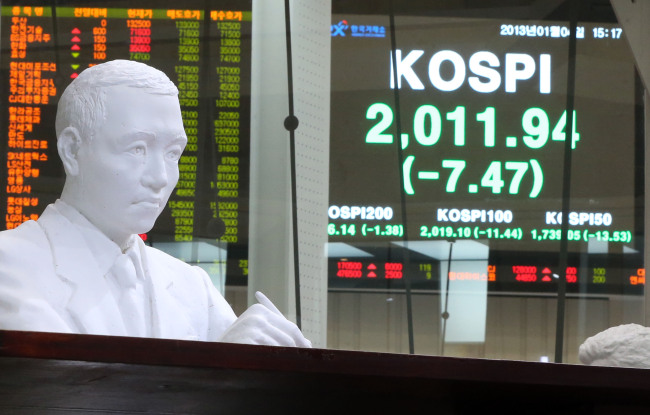Foreigners’ securities holdings hit record
But experts say Korea still vulnerable to external macroeconomic factors
By Park Hyung-kiPublished : Jan. 4, 2013 - 20:10
Foreign shareholdings in Korean stocks and bonds have hit a record-high due to monetary easing overseas that led to the inflow of funds investing in higher yielding and riskier assets
Equity and debt investments by foreign investors reached 502.6 trillion won in total as of the end of 2012, mainly driven by funds from Europe and the U.S. where central banks had been printing and pumping money to stimulate their economies, according to Financial Supervisory Service data.

It showed that the U.S. was the biggest investor in Korea’s capital market where it held equities worth 164 trillion won and bonds worth 19 trillion won.
The Korean stock market had been marked among the top Asian destinations for foreign investment as advanced economies suffered a slowdown stemming from the debt crises.
However, at the same time, the country was vulnerable to erratic volatility as external microeconomic factors tend to cause stock prices to fluctuate, more so than corporate fundamentals due to Korea being an export-led economy.
With foreign investors holding the “liquidity key” in the stock market where their investments have continued to account for over 30 percent of market cap, analysts said Seoul stocks underwent increased volatility and corrections, said JH Shin, an equity strategist at Etrade Securities.
The sovereign debt crisis in Europe, the fiscal cliff in the U.S. and China’s economic slowdown weakened not only investor sentiment but also the outlook on Korean exports, which rely on those three major buyers of Korean products.
Korea is faced with another obstacle -- a strong won against the Japanese yen, said Bae Sung-young, an equity analyst at Hyundai Securities.
“A weak yen may turn out to be a negative factor for Korean manufacturers such as automakers competing in overseas markets with Japanese companies,” Bae said.
A strong won will make Korean products lose their price competitiveness in overseas markets to Japan, which also plans to stand by a policy promoting a weak currency to revive its economy through exports.
There are reassuring signs that the U.S. and Europe will recover this year, which will likely boost Korean stocks and make them less volatile.
China also recently showed an improved manufacturing data, a sign that the world’s second largest economy will maintain its growth.
“Things may look better this year, but not enough to give steady momentum in the short-term,” said Shin.
By Park Hyong-ki
(hkp@heraldcorp.com)




![[Weekender] Korean psyche untangled: Musok](http://res.heraldm.com/phpwas/restmb_idxmake.php?idx=644&simg=/content/image/2024/05/02/20240502050841_0.jpg&u=)



![[Eye Interview] 'If you live to 100, you might as well be happy,' says 88-year-old bestselling essayist](http://res.heraldm.com/phpwas/restmb_idxmake.php?idx=644&simg=/content/image/2024/05/03/20240503050674_0.jpg&u=)








![[Herald Interview] Director of 'Goodbye Earth' aimed to ask how we would face apocalypse](http://res.heraldm.com/phpwas/restmb_idxmake.php?idx=652&simg=/content/image/2024/05/03/20240503050732_0.jpg&u=)
